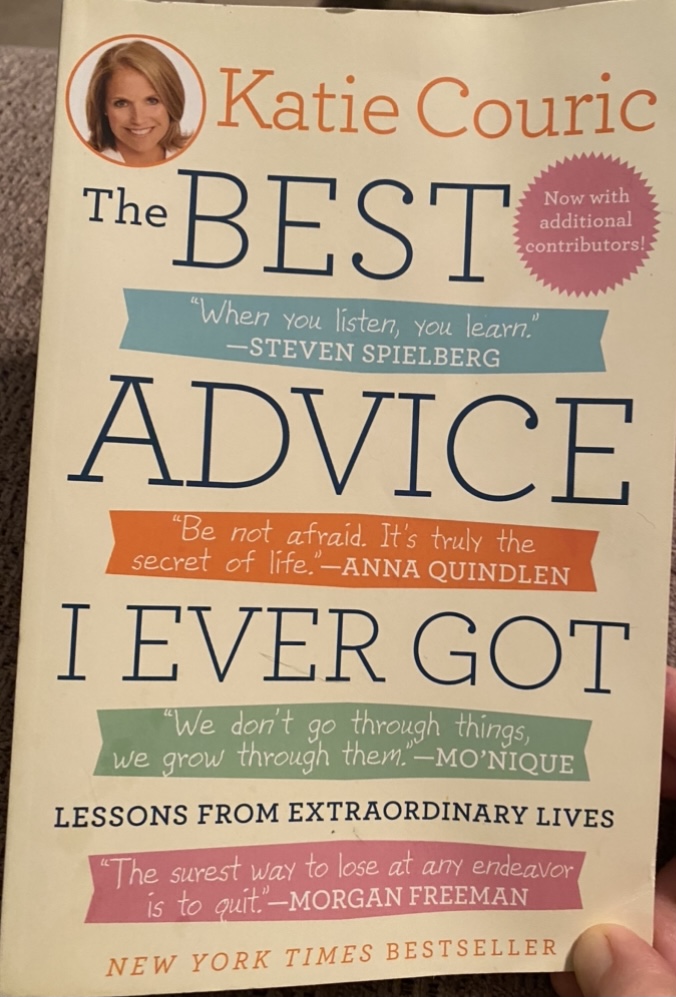The Best Advice I Ever Got

You know the Simpsons episode where Homer gives Marge a bowling ball for her birthday? When she points out that she doesn’t bowl, Homer says “If you don’t want it I know someone who does!” and you see that the bowling ball says “Homer” on it. We have a lot of gifts that are “Homer bowling balls” around here. For Christmas, I gave my husband Katie Couric’s book, The Best Advice I Ever Got: Lessons from Extraordinary Lives. And I’ve been enjoying it immensely! Katie has compiled stories and advice from dozens of varied and notable people such as Beyonce (“Take time to know yourself”), Donald Trump (“Know everything you can”) (*IMPORTANT NOTE- this book was published in 2012*), Curtis Sittenfeld (“Don’t marry someone who’s more neurotic than you”), and Martha Stewart (“Gather the good things”)- to name a few. But my favorite essay so far is by Wynton Marsalis, the successful and well-known classical and jazz trumpet player. His story was particularly meaningful to me, because my son Paul is a trumpet player. Paul is currently a music major at Baylor University. Baylor has a great Music Education program, and a lot of people go there to get a Music Ed degree so they have something to fall back on if playing doesn’t work out. Paul knows that he doesn’t want to teach- he wants to play, so he’s there for a Music Performance degree. In the book, Wynton describes people’s reactions to his decision to pursue a career as a professional trumpet player.. His teachers discouraged it, advising that it would be too difficult to make a living. People told him he would need a “real” profession to fall back on when music didn’t work out. His mother told him if he went into music, he would struggle and suffer just like his father. But his father, a musician himself, told him this: “Make sure you don’t have anything to fall back on… because you will.” Wynton’s advice: Commit with your whole heart. This makes me think of the common practice of going into a race with an A, B, and C goal. What happens when the race gets really, really tough, and we have a lesser goal to fall back on? There’s a good chance we’ll take that option. I love this race recap by Janae, Hungry Runner Girl, where she talks about reaching her goal of a sub-3 hour marathon after years and years of trying. She got to mile 20 of her race and was suffering so much that she thought, “It’s okay. I don’t have to go any faster than this- I won’t get my sub-3, but it’ll still be a PR.” But then she thought, no! I came to run a sub-3 hour marathon, and that’s what I’m going to do. She describes how she pushed herself so hard that her eyes felt fuzzy in the last mile and she felt like she was going to fall. But she crossed the finish line in 2:59:14 because she was fully committed to her goal. But what happens if we fully commit and don’t achieve our goal? Wanting something badly and putting everything we have into it doesn’t guarantee we’ll succeed. There are always factors beyond our control, and sometimes our best just isn’t good enough. What then? Well… we’ll probably be really, really disappointed and sad. And then, after we get over that, we’ll try again. Maybe in a different way, or we’ll try something new. My son may become a professional trumpet player, and he may not. I hope for his sake that he succeeds. And if he doesn’t I have complete faith in him that he’ll figure something else out. The one thing he’ll never, ever have to do is look back and wonder what could have happened if he had just committed with his whole heart. What about you- do you believe in setting A,B and C goals for big races? What about life decisions- do you like to commit fully, or have a backup plan?